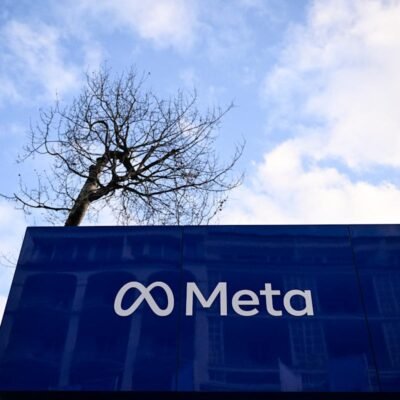Are you looking for the best alternative to QuickNode Streams? If so, you’ve come to the right place. In this guide, we introduce Moralis’ Streams API—the best solution for setting up Web3 data pipelines. With our intuitive interface, you can effortlessly monitor wallet or smart contract events on any chain with just a few clicks. For a quick overview, check out this table highlighting the benefits of Moralis Streams compared to QuickNode Streams:
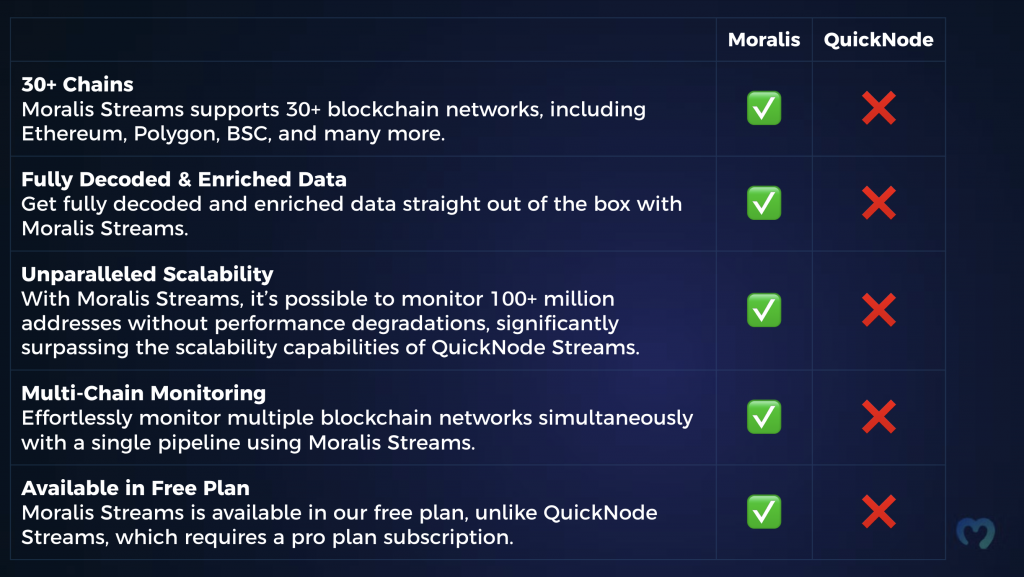
For a more in-depth breakdown of the table, further information on QuickNode and Moralis, and a tutorial on how to set up your own data pipelines, join us in this guide as we lay it all out for you!
Ready to start using the Streams API immediately? Sign up with Moralis for free to get instant access to our industry-leading development tools!
Overview
QuickNode Streams is a solution allowing developers to set up Web3 data pipelines. However, while they offer a solid service, it’s not without significant flaws. For instance, QuickNode Streams offers limited chain support, and each stream is restricted to just one chain. Additionally, QuickNode Streams has low flexibility, as it’s only possible to configure data pipelines based on a small number of predefined datasets. Luckily, there are several prominent QuickNode Streams alternatives, and at the top of the list, you’ll find Moralis’ Streams API!

But what exactly is Moralis’ Streams API? How does it work? And why is it the best QuickNode Streams alternative? If you’re looking for the answers to these questions, then this read is for you. Let’s dive straight in!
What is QuickNode Streams?
QuickNode Streams provides a way to set up Web3 data pipelines, enabling real-time streaming of blockchain events into decentralized applications (dapps), databases, and other platforms. Designed with simplicity in mind, QuickNode handles the underlying complexities of streaming blockchain data, allowing developers to create Web3 data pipelines with just a few clicks.

So, how does QuickNode Streams work?
- Configure a Stream: Choose a blockchain network, select one of the predefined datasets, and specify the block range to capture on-chain data.
- Connect a Destination: Select where the data should be sent as soon as new blocks are finalized.
- Consume the Data: Integrate the stream into your dapp, platform, or database and consume the real-time data.
With this overview of QuickNode Streams, let’s delve into some of the limitations of this service.
Limitations of QuickNode Streams
While you can use QuickNode Streams to set up Web3 data pipelines, it might not be the ideal alternative for you. To explain why, we have outlined four limitations of this service below:
- Limited Chain Coverage: QuickNode Streams features limited chain coverage, supporting only 20 networks.
- Single Chain Monitoring: Developers can track just one chain per stream with QuickNode, meaning a separate pipeline is required for each network they intend to monitor.
- Low Flexibility: The service restricts stream configuration to a small number of predefined datasets, limiting developers’ ability to track specific events, smart contracts, and wallets.
- No Free Plan: QuickNode Streams is unavailable in QuickNode’s free plan. Access to this service requires a monthly subscription to the pro plan, which costs $49.
Given these limitations, QuickNode Streams may not be the ideal solution for building advanced dapps. Instead, let’s explore a superior alternative—Moralis’ Streams API!
Introducing Moralis’ Streams API – The Top QuickNode Streams Alternative
Moralis’ Streams API is the ultimate solution for streaming real-time blockchain data directly into your dapps and databases. Our intuitive user interface allows you to effortlessly set up Web3 data pipelines with just a few clicks. In return, you receive instant updates on any wallet or contract event via Web3 webhooks as soon as they occur!

The Streams API offers unparalleled scalability and is the industry’s most comprehensive Web3 streams solution, supporting all major blockchains, including Ethereum, Polygon, BNB Smart Chain (BSC), and many more.
Additionally, the Streams API covers all types of events, tokens, wallets, DeFi platforms, and more, enabling you to customize your streams to fit any use case seamlessly. As such, this solution provides everything you need for real-time Web3 data.
By leveraging the Streams API, you can integrate features like real-time alerts into your projects, populate your databases with the latest data, and enhance the overall experience of your dapps with timely, actionable insights.
Now that you have an overview of Moralis’ Streams API, let’s explore some of the key benefits of this industry-leading solution!
Benefits of the Streams API
So, what makes Moralis’ Streams API the best QuickNode Streams alternative? To answer this question, let’s explore five benefits of this top-tier tool:
- Comprehensive Cross-Chain Support: Moralis Streams supports over 30 blockchains, enabling you to set up Web3 data pipelines for all major networks.
- Enriched & Decoded Data: With Moralis Streams, you can get fully enriched and decoded responses for each event, including token decimals, address labels, balance details, and more.
- Unparalleled Scalability: Designed for scalability, Moralis Streams allows you to seamlessly manage anything from one to 100+ million addresses within a single stream. As such, as your projects grow, you’ll see no performance degradation in your dapps.
- Multi-Chain Monitoring: Monitor multiple chains in a single stream, eliminating the need to create a new pipeline for each chain you interact with.
- Available in Free Plan: Moralis Streams is available in our free plan, allowing you to try it out without any cost.
That covers the basics of Moralis Streams. In the next section, we’ll compare Moralis Streams and QuickNode Streams to underscore the key differences between these two services!
Moralis Streams Vs. QuickNode Streams

Full Tutorial: How to Get Real-Time Data with Moralis Streams
With Moralis Streams, you can effortlessly create customized Web3 data pipelines with just a few clicks. To demonstrate, here’s an eight-step tutorial on how to monitor USDC transactions:
- Step 1: Register for a free account with Moralis, log in, go to the “Streams” tab, and click the “+ Create Stream” button:
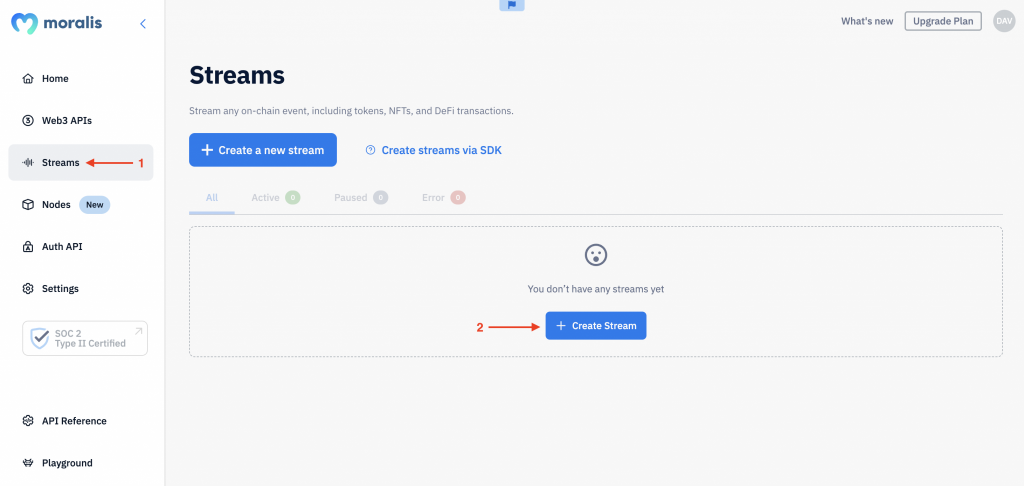
- Step 2: Name your stream and select the type of events you want to track. For this tutorial, we’ll choose “Contract Events”. You can also opt to exclude potential spam events to filter out unwanted on-chain activity:
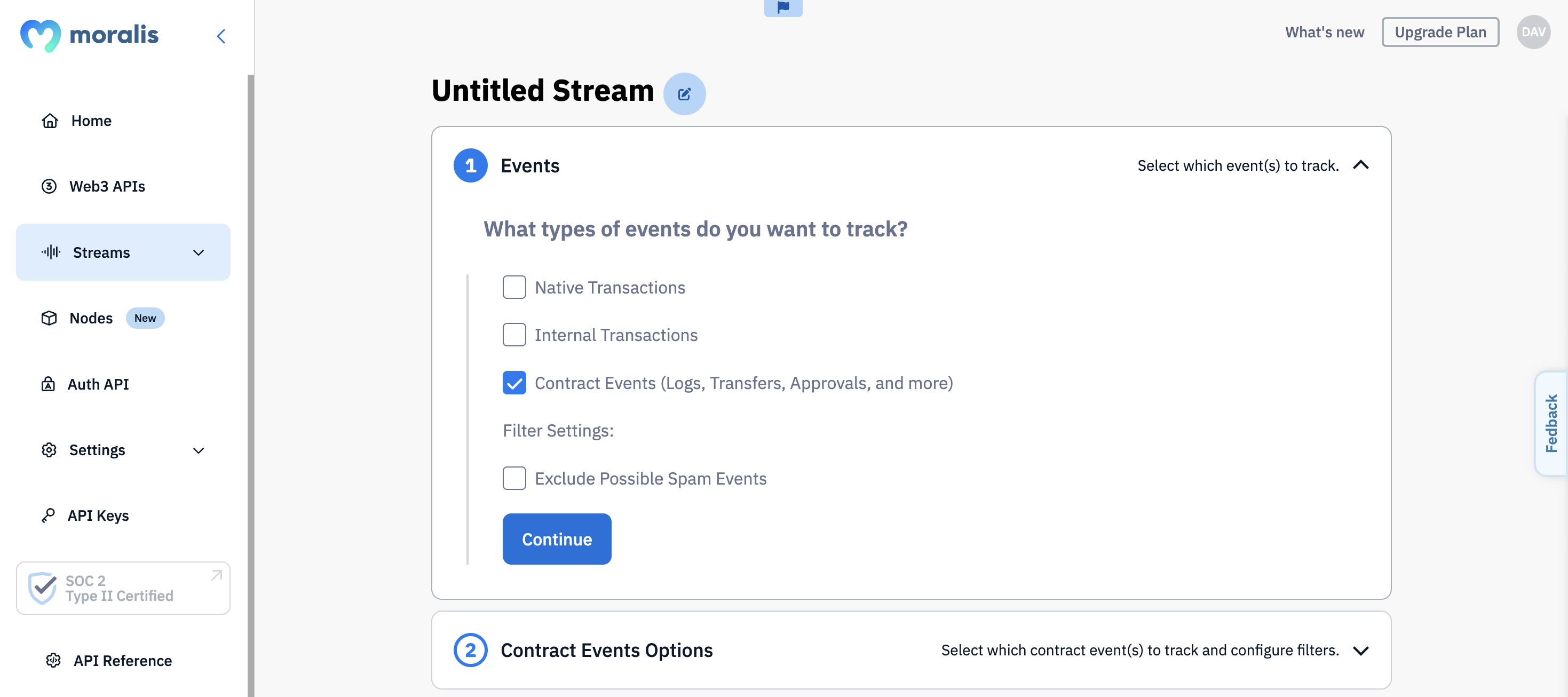
- Step 3: Select the contract events you wish to track. In this case, choose “Common Events” followed by “Token Transfers”:
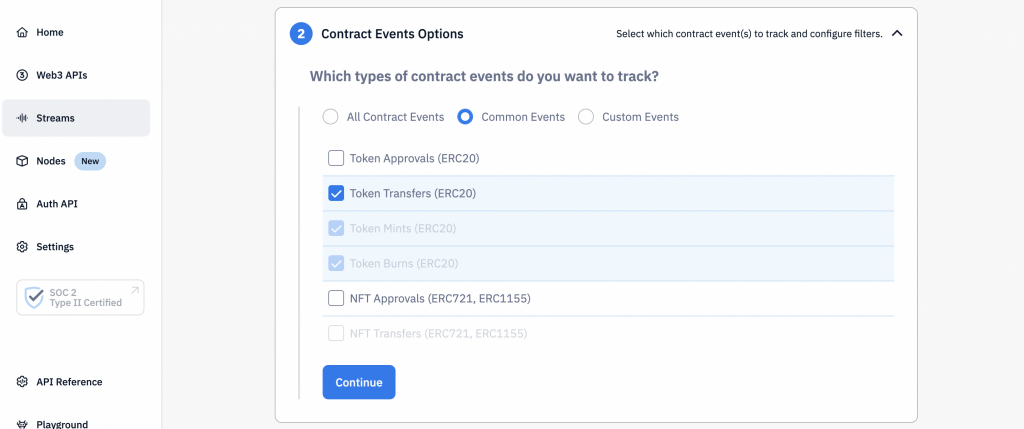
- Step 4: Add a tag to your stream and select other information you want to include in the responses:
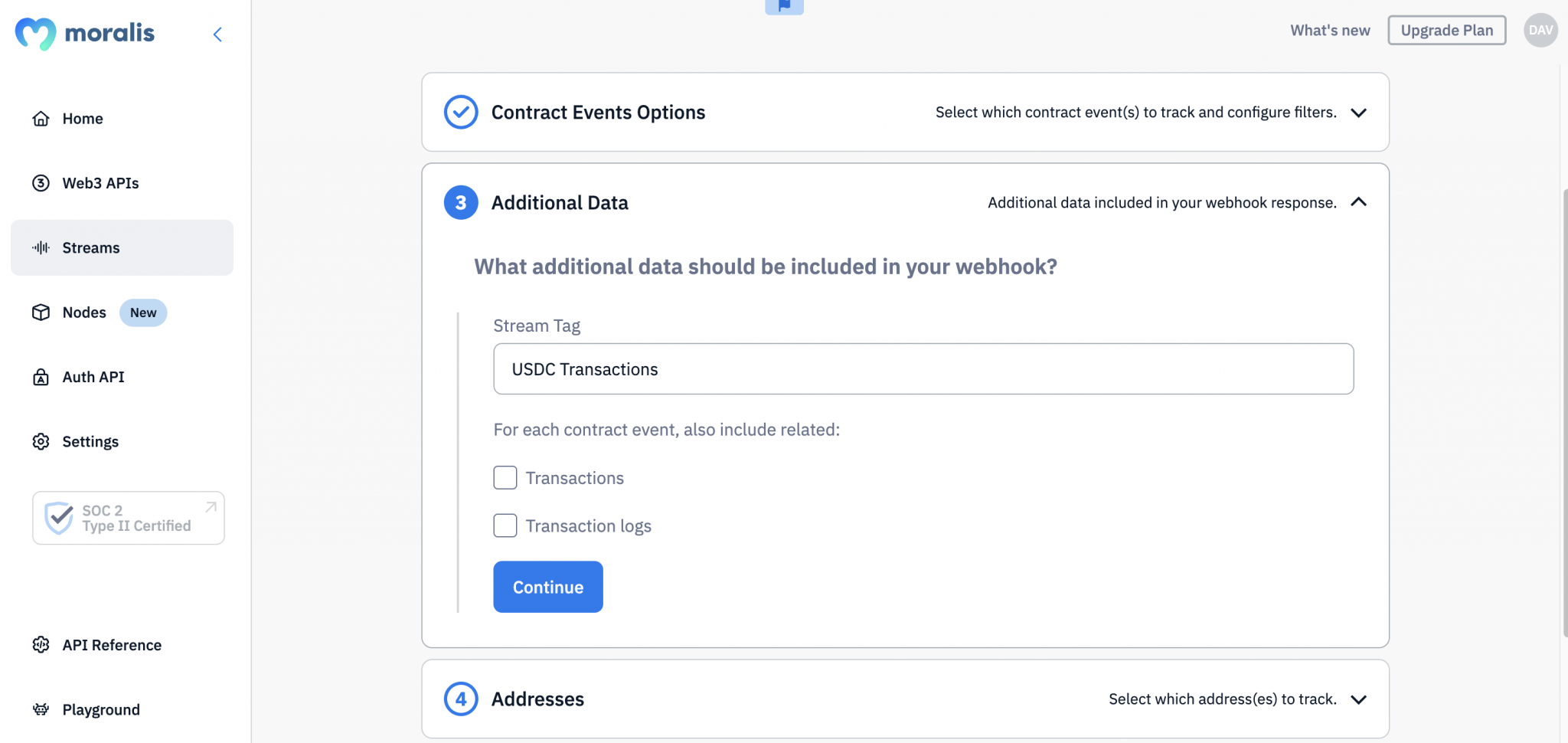
- Step 5: Add the contract address/addresses you wish to monitor. For this tutorial, we’ll add the USDC contract address:
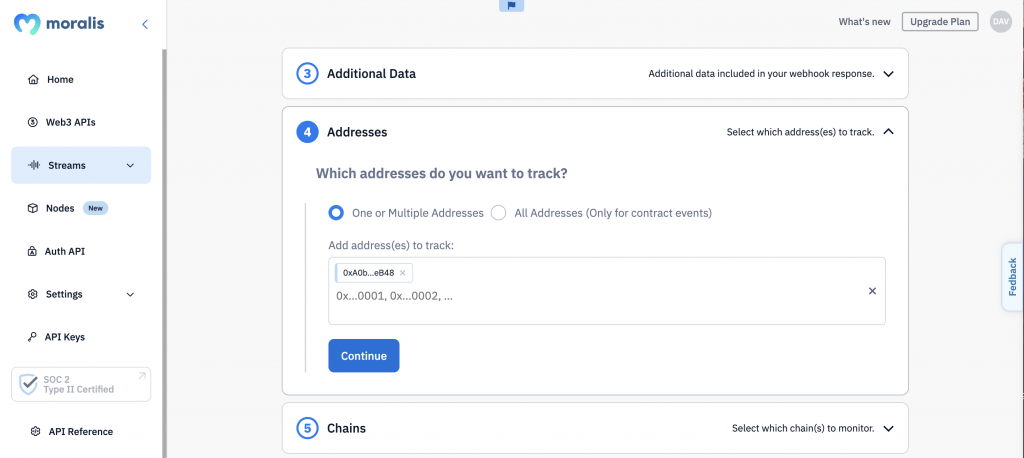
- Step 6: Select the chain(s) you want to monitor. We’ll choose Ethereum, but you can select as many networks as you’d like:
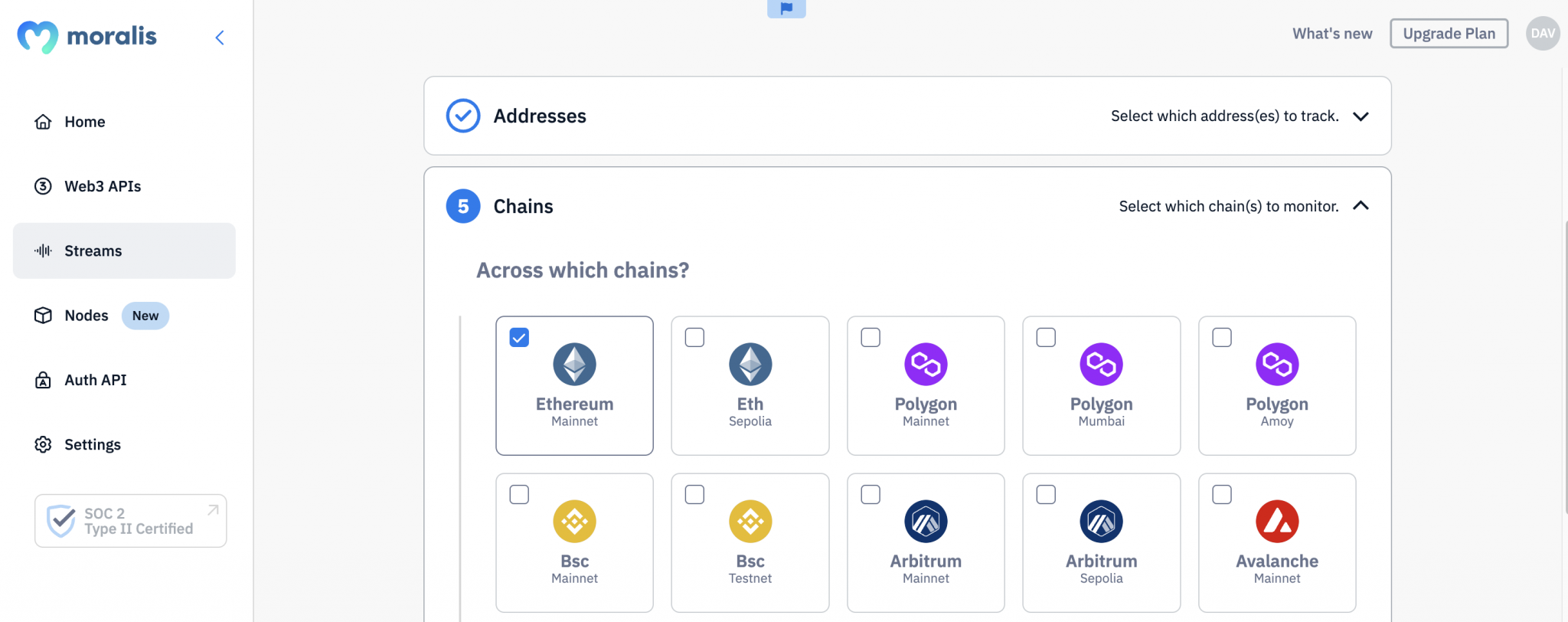
- Step 7: Test your stream (optional):
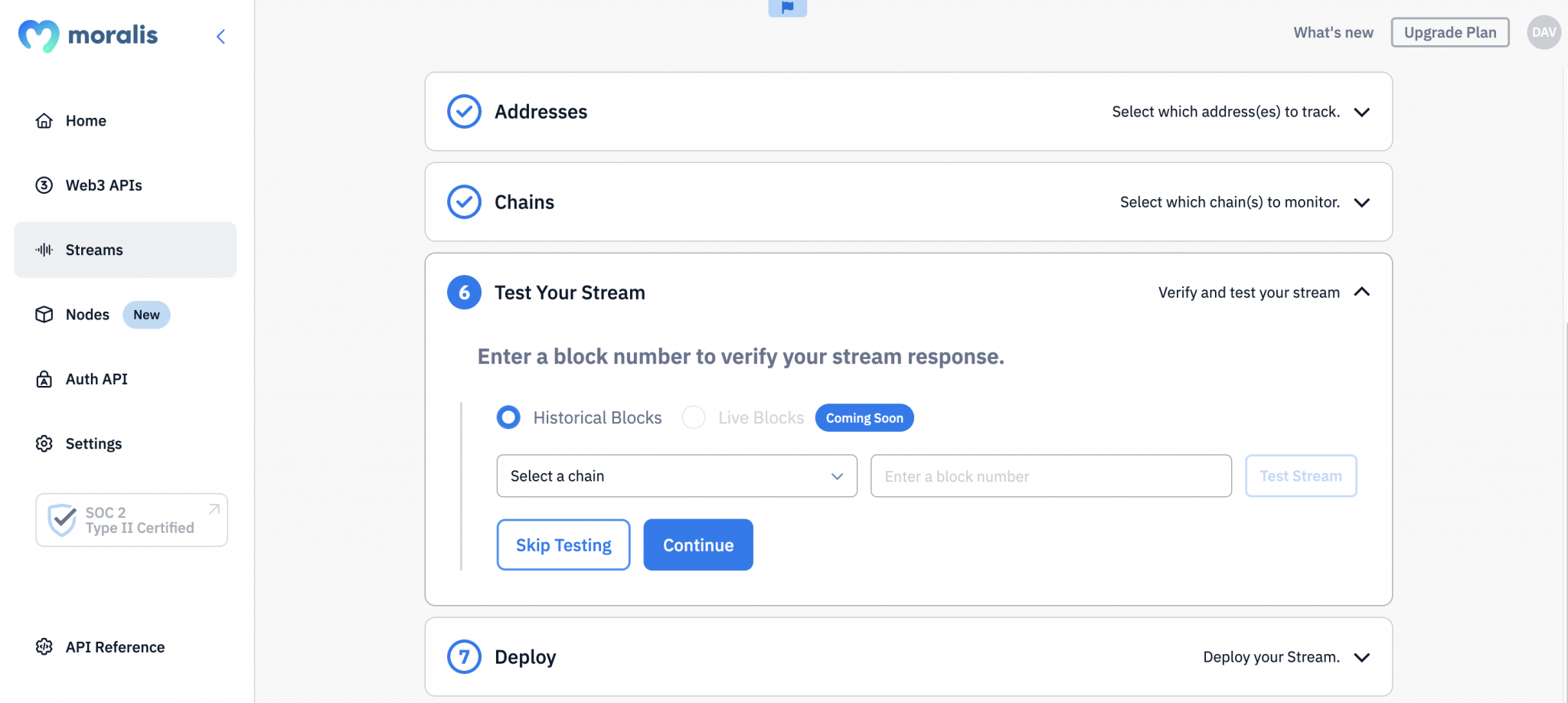
- Step 8: Add your webhook URL, hit the “Continue” button, and click “Save & Deploy”:
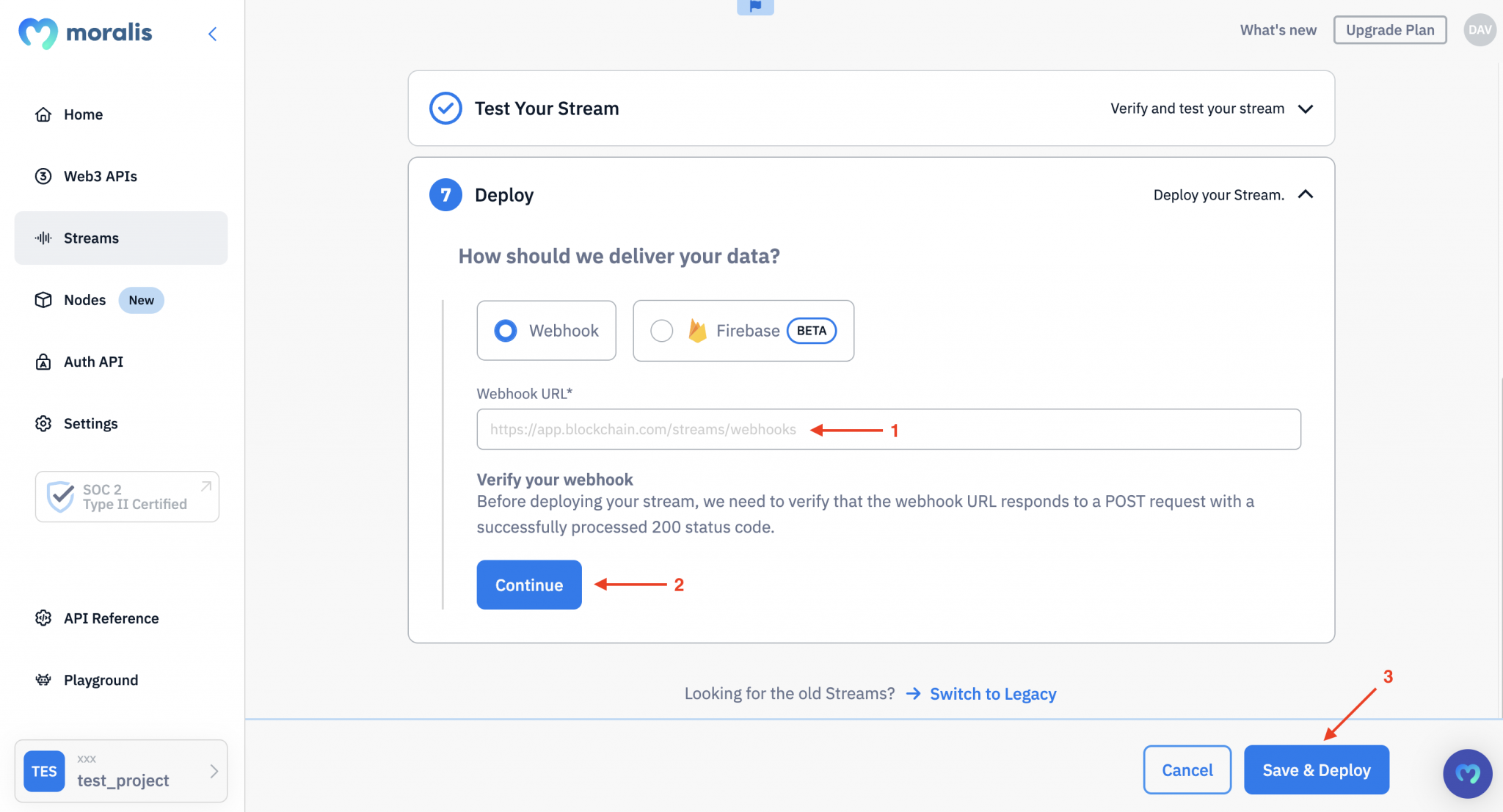
You will now receive real-time updates sent to your webhook destination whenever there’s a USDC transfer. Here’s an example of what it might look like:
//...
{
transactionHash: '0x1a3807aa7f7d1f4806245115d7b8a32ec105ce20f2b4a8ca31f9a305127c0201',
logIndex: '409',
contract: '0xa0b86991c6218b36c1d19d4a2e9eb0ce3606eb48',
triggered_by: [Array],
from: '0x47fbac3d17dcd481c3bb428adde4272b458cf724',
to: '0x8ad599c3a0ff1de082011efddc58f1908eb6e6d8',
value: '5187003613',
tokenName: 'USD Coin',
tokenSymbol: 'USDC',
tokenDecimals: '6',
valueWithDecimals: '5187.003613',
possibleSpam: false
},
/...
Congratulations! You now know how to get real-time blockchain data with Moralis Streams. From here, you can now follow these steps to create Web3 data pipelines for other custom events!
Please check out the Moralis YouTube video below for a more detailed breakdown of the steps above and an example of how to use the data from your stream in a real-world application:
Moralis Stream Use Cases
Moralis Streams is a versatile tool that is suitable for various use cases. Here are three key examples:
- Database Ingestion: Track, index, and store events in your databases as they occur. This allows you to maintain an accurate and comprehensive historical record of on-chain events for any asset, smart contract, or address.
- Track Assets: Monitor any ERC-20 or NFT token on any network effortlessly. Seamlessly track users’ wallet holdings in real-time and enable powerful features like token gating.
- Real-Time Alerts: With Moralis Streams, you can receive updates in real-time whenever important on-chain events occur. This makes it the ultimate tool for integrating alerts into your dapps.

The examples above only scratch the surface of what’s possible with Moralis Streams. Thanks to the flexibility of this tool, you can set up data pipelines for virtually any use case you can imagine!
Success Story: How Beoble Monitors 1M+ Addresses with Moralis Streams
Beoble is a Web3 chat and social platform enabling decentralized wallet-to-wallet communication. With Beoble, users can access token-gated chat rooms based on the NFTs and ERC-20 tokens in their wallets!
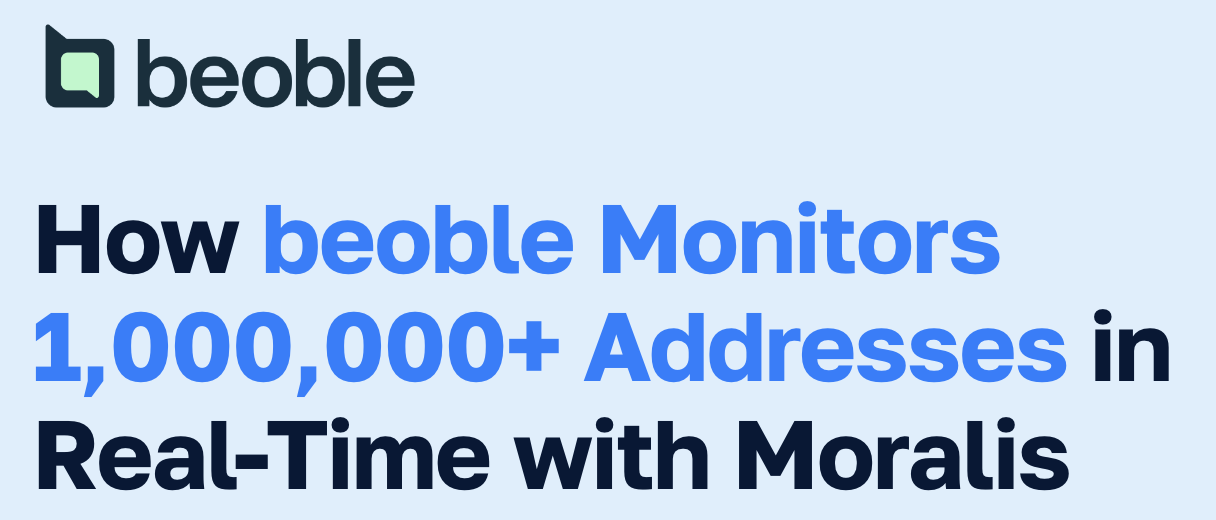
But with over 600,000 unique users, how is beoble tracking that many addresses?
Beoble effortlessly monitors 1M+ addresses in real-time using Moralis Streams. Our premier solution allows beoble to track all transfer events for any address. In turn, they can keep track of users’ wallet holdings, ensuring that they only have access to relevant chat rooms.
Without Moralis, beoble would have needed weeks to develop the infrastructure to monitor over 1,000,000 addresses:
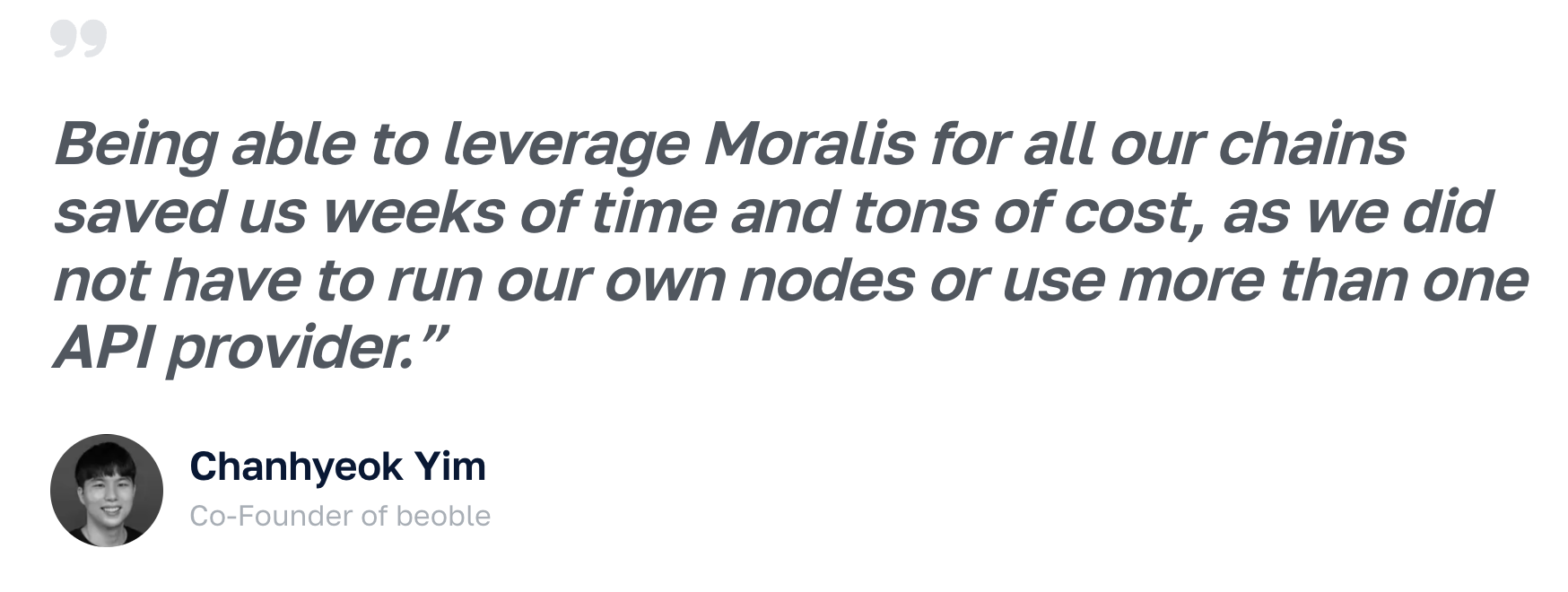
Learn more about Beoble’s success here: beoble.
Beyond Streams – Exploring Moralis Further
Moralis is the leading data provider in Web3, offering premier development tools like RPC nodes and over ten specialized Web3 APIs. In our suite, you’ll find the Wallet API, Token API, NFT API, and many more interfaces, ensuring your data needs are covered for any project, whether it’s a cryptocurrency wallet, DeFi dapp, or other platforms!

But what sets our APIs apart in Web3?
- Comprehensive: Our APIs deliver extensive data with fewer calls, providing both on-chain and off-chain data in a single request.
- Cross-Chain: Enjoy full feature parity across all major blockchains with our cross-chain compatible APIs, simplifying your developer experience as you don’t need a new provider for each chain you interact with.
- Secure: Benefit from enterprise-grade data security as Moralis is the only SOC 2 Type 2 certified Web3 infrastructure provider.
In the next section, we will explore our suite a bit more to further highlight the value of our APIs!
Moralis’ Web3 APIs
In our Web3 API suite, we offer over ten top-tier interfaces. Here are three key examples:
- Wallet API: With the Wallet API, you need only single lines of code to get a wallet’s history, profitability, DeFi positions, token balances, and more. It’s the perfect tool for building wallets and integrating wallet functionality into dapps.
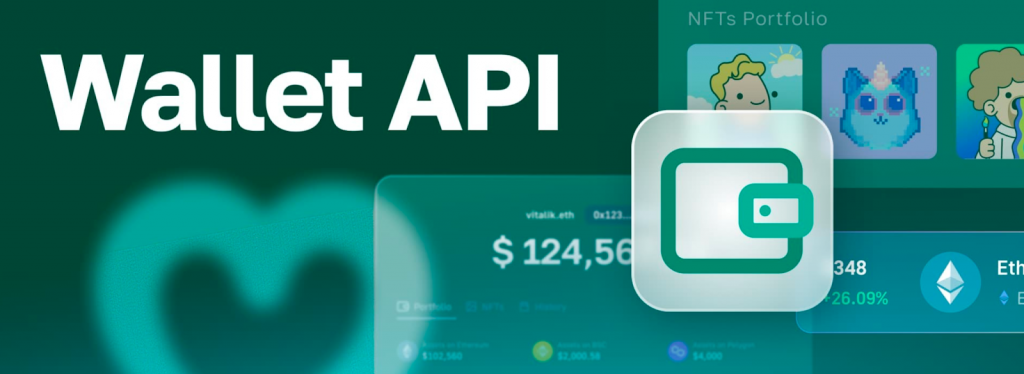
- Token API: The Token API lets you seamlessly fetch token balances, prices, metadata, and more, covering all your ERC-20 data needs. This makes the Token API ideal for building DEXs, token explorers, and similar platforms.
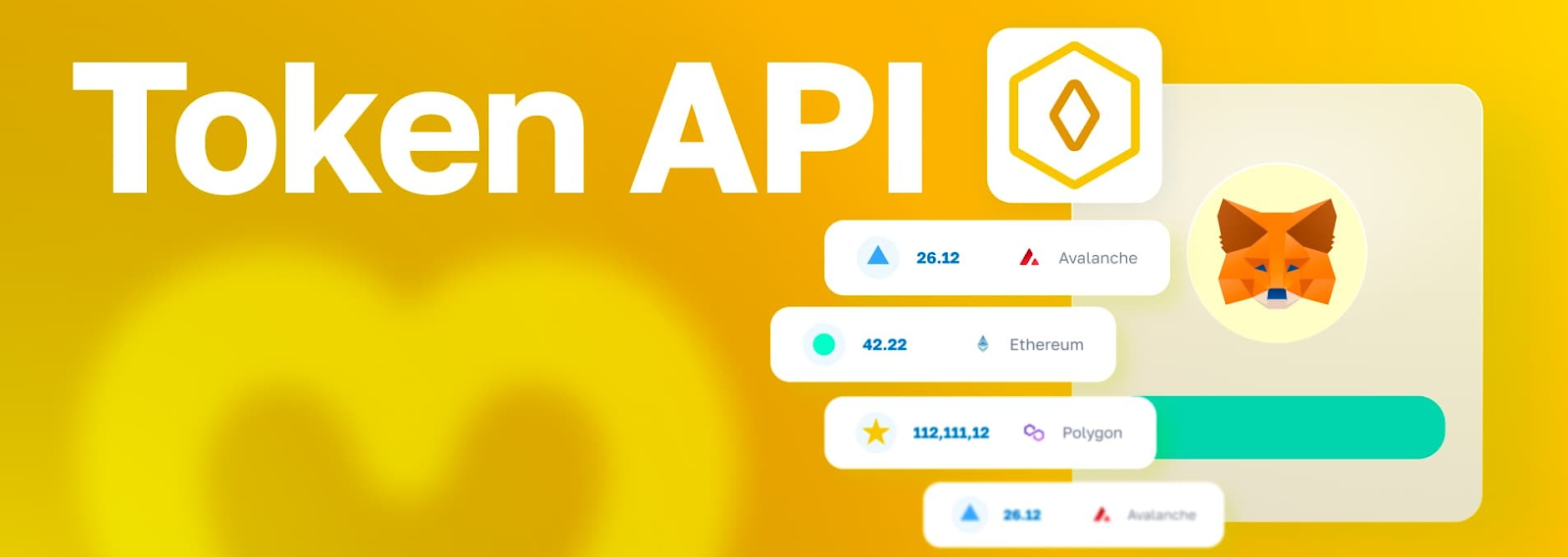
- NFT API: With Moralis’ NFT API, you need only single calls to fetch NFT balances, metadata, prices, and more. As such, if you’re building NFT marketplaces, Web3 games, or other NFT-based platforms, check out this premier tool.

Explore all our premier interfaces on the official Web3 API page for more information!
Summary: Easiest Way to Stream Real-Time Web3 Data – Top QuickNode Streams Alternative
QuickNode Streams is a solution that streamlines the process of setting up Web3 data pipelines. However, while it’s a solid service, there are some limitations you should consider. For one, QuickNode Streams has limited chain support and restricts each stream to just one single blockchain. What’s more, QuickNode Streams also limits stream configurations to a small number of predefined datasets, significantly reducing flexibility. Fortunately, there is a better alternative to QuickNode Streams: Moralis’ Streams API!
Moralis’ Streams API is the ultimate solution for setting up Web3 data pipelines. With our intuitive point-and-click interface, you can now set up streams without breaking a sweat!
But what makes Moralis the top QuickNode Streams alternative?
To answer this question, check out our brief comparison table below highlighting the benefits of Moralis Streams:

If you liked this QuickNode Streams alternative guide, consider checking our similar content here on the blog. For instance, read our Alchemy Pipelines article or our Ethers.js guide!
Also, if you wish to use the Streams API yourself, don’t forget to create an account with Moralis. You can register an account for free, and you’ll gain immediate access to our industry-leading suite of development tools!




